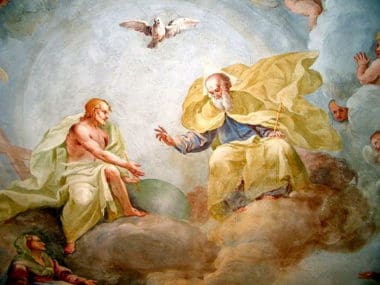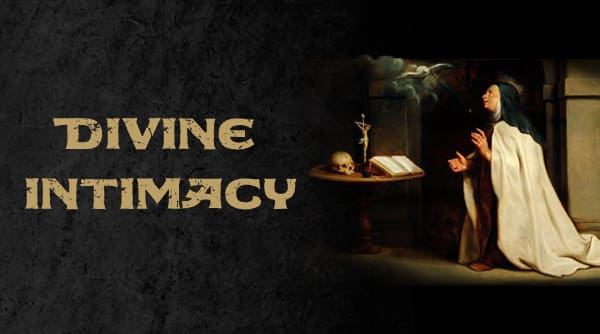From the Eucharist to the Trinity
Presence of God– O Jesus, lead me to the Trinity; help me to live with the Trinity.
MEDITATION
Jesus came to us from the bosom of the Father to bring us to the Trinity; this was the purpose of the Incarnation and it is also that of the Eucharist, which prolongs the mystery of the Incarnation in time. In the Eucharist Jesus continues to be the Mediator between the three divine Persons and ourselves, holding out His hand to lead us to Them. It is by coming to us in Holy Communion that He continually puts us in more direct contact with the Blessed Trinity; for He then comes in the integrity of His Person as God and Man, humanity and divinity; and as God, as the Word, He is always indissolubly united to the Father and to the Holy Spirit. Jesus can repeat from the  consecrated Host what He once said while He was on earth: “He that sent Me is with Me, and He hath not left Me alone,” and more explicitly: “I am in the Father and the Father [is] in Me” (cf John 8:29 – 14:11). Therefore, when He comes to us in Holy Communion, He does not come alone, but with Him come the Father and the Holy Spirit, because the three divine Persons, although distinct one from another, are inseparable. The presence of the Trinity in our soul is not limited to the moments when Jesus is sacramentally present within us, for the three divine Persons dwell permanently in a soul that is in the state of grace. It is true, however, that the Trinity is present in a very special way in Christ, the Incarnate Word, the one Man personally united to the Trinity and in whom dwells all the fullness of the divinity: “In quo habitat omnis plenitudo divinitatis” (Litany of the Sacred Heart). Hence, it is certain that wherever Christ is—and therefore in our soul at the time of Communion—there the Trinity is also present in a very special way.
consecrated Host what He once said while He was on earth: “He that sent Me is with Me, and He hath not left Me alone,” and more explicitly: “I am in the Father and the Father [is] in Me” (cf John 8:29 – 14:11). Therefore, when He comes to us in Holy Communion, He does not come alone, but with Him come the Father and the Holy Spirit, because the three divine Persons, although distinct one from another, are inseparable. The presence of the Trinity in our soul is not limited to the moments when Jesus is sacramentally present within us, for the three divine Persons dwell permanently in a soul that is in the state of grace. It is true, however, that the Trinity is present in a very special way in Christ, the Incarnate Word, the one Man personally united to the Trinity and in whom dwells all the fullness of the divinity: “In quo habitat omnis plenitudo divinitatis” (Litany of the Sacred Heart). Hence, it is certain that wherever Christ is—and therefore in our soul at the time of Communion—there the Trinity is also present in a very special way.
COLLOQUY
“O Jesus Christ, true God and true Man! My soul rejoices to find You in the Blessed Sacrament, You, the uncreated God who became man, a creature! In this Sacrament, O Christ, I find both Your humanity and Your divinity; from Your humanity I rise to Your divinity, and from it I go back to Your humanity. I see Your ineffable divinity which contains all the treasures of wisdom, of knowledge, of incorruptible riches. I see the inexhaustible fountain of delights which alone can satisfy our intelligence. I see Your most precious soul, O Jesus, with all the virtues and gifts of the Holy Spirit, a holy and unspotted oblation; I see Your sacred Body, the price of our redemption; I see Your Blood, which purifies and vivifies us; in brief, I find treasures which are so precious and so great that I cannot comprehend them.
“This Sacrament really contains You, O my God, You whom the Angels adore, in whose presence the Spirits and mighty Powers tremble. Oh! if we could only see You as clearly as they do, with what reverence would we approach this Sacrament, with what humility would we receive You.
“O Most Holy Trinity, You instituted this Sacrament in order to obtain the object of Your love, that is, to attract to Yourself the soul of Your creature, and detaching it from all earthly things, to unite it to Yourself, the uncreated God. In doing this, You make it die to sin and give it spiritual life, eternal life. O Blessed Trinity, this Sacrament was instituted by Your infinite goodness that we might be united to You and You to us; that we might receive You into ourselves and be received by You; that at the same time we might hold You within ourselves and be held by You” (St. Angela of Foligno).
 Note from Dan: This post “From the Eucharist to the Trinity” is provided courtesy of Baronius Press and contains one of two meditations for the day. If you would like to get the full meditation from one of the best daily meditation works ever compiled, you can learn more here: Divine Intimacy. Please honor those who support us by purchasing and promoting their products.
Note from Dan: This post “From the Eucharist to the Trinity” is provided courtesy of Baronius Press and contains one of two meditations for the day. If you would like to get the full meditation from one of the best daily meditation works ever compiled, you can learn more here: Divine Intimacy. Please honor those who support us by purchasing and promoting their products.
Art for this post “From the Eucharist to the Trinity”: Trinità (The Holy Trinity), Luca Rossetti da Orta, 1738-9, PD-US, Wikimedia Commons. Father Gabriel of St. Mary Magdalen, mirror from open source material.




